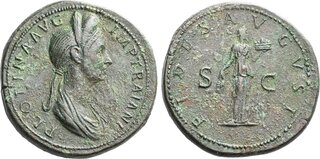| Numismatica Ars Classica > Auction 144 with CNG & NGSA | Auction date: 8 May 2024 |
| Lot number: 1061 Price realized: This lot is for sale in an upcoming auction - Bid on this lot  | Show similar lots on CoinArchives Find similar lots in upcoming auctions on |
| Lot description: The Geoffrey Cope Collection of Ancient Greek and Roman Bronzes. The Roman Empire. Plotina, wife of Trajan. Description Sestertius, Roma 112-117, Æ 34 mm, 26.89 g. PLOTINA AVG – IMP TRAIANI Diademed and draped bust r., wearing double metal stephane. Rev. FIDES – AVGVST S – C Fides standing r., holding basket of fruit with l. hand and barley ears in r. Reference C 12 Reference BMC Trajan 1080 RIC Trajan 740 CBN Trajan 730 L. D'Orazi, La collezione Numismatica di Prospero Sarti e il Mistero del Ripostiglio di Bolsena, in Quaderni di Studio XV, 2020, p. 150 (this coin illustrated) Woytek 711 Condition Extremely rare and in unusually fine condition for the issue. A superb portrait of excellent style struck in high relief and a brown-green patina. Surface somewhat rough, otherwise about extremely fine / good very fine Provenance Sangiorgi sale 7th May 1906, Sarti, 349 Sangiorgi sale 18th November 1907, Martinetti-Nervegna, 1913 From a hoard of the end of XIX century (Bolsena ?) Note: The coin is published in Coin Week. It is impossible to assess the influence Plotina had on her husband, Trajan, for she is scarcely mentioned in the ancient sources. If we are to believe Dio Cassius (68.5.5) and the far later Historia Augusta, she was a modest woman who, if anything, was a restraining force who insisted on high moral standards. Both relate a story that when Plotina entered the imperial palace for the first time as the wife of an emperor, she turned to those gathered at the steps and declared "I enter here such a woman as I would wish to be when I leave." Despite her apparent moral rigour, she is chiefly remembered for her undying support for her husband's eventual successor, Hadrian. The Historia Augusta describes how Trajan was not particularly fond of Hadrian, but that Plotina insisted on his marriage to Sabina, the daughter of Trajan's niece Matidia. The worst accusations, however, concern Plotina's role in assuring that Hadrian succeeded Trajan, who most sources suggest had made no provisions for Hadrian at the time of his death. Eutropius reports: "After Trajan's death Aelius Hadrian was appointed emperor, not, indeed, through any desire on the part of Trajan, but through the agency of Plotina, Trajan's wife, for Trajan, while he was still alive, had refused to adopt him although he was the son of his cousin." (Breviarium 8.6). The sources present a wide array of scenarios. We are told that Plotina delayed the announcement of her husband's death so she could forge a letter of adoption that named Hadrian his successor, or that she lied about the content of the will. The Historia Augusta goes so far as to suggest that after Trajan was dead, Plotina had someone imitate his tired voice to proclaim Hadrian his successor. Even the most flattering versions suggest Plotina went to great effort to convince Trajan, on his deathbed, to adopt Hadrian. The Historia Augusta and Cassius Dio suggest two other men, Trajan's brother-in-law L. Julius Servianus and his confidant L. Neratius Priscus, were his preferred heirs. It was also rumoured that he intended to name no candidate at all, but to leave it to the senate to appoint his successor. If Plotina engineered the accession of Hadrian, she was one of the great architects of the Roman world, and changed the course of history in ways that might be hard to fathom. Hadrian's principate was surely unique, and his decision to reverse the expansionist policies of Trajan had a profound effect on the course of events. Estimate: 7500 CHF |  |



